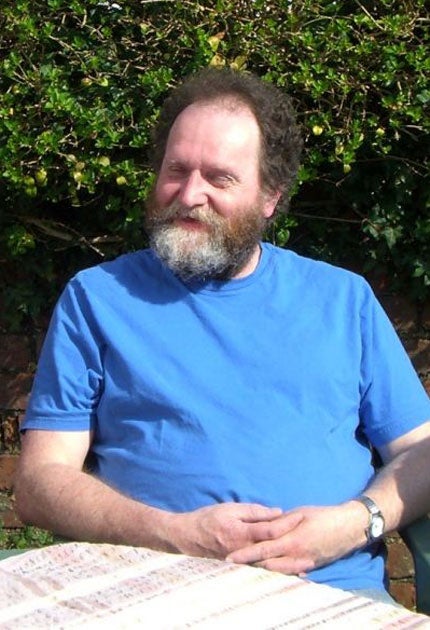Meirion Pennar: Poet who challenged his readers to understand his cerebral verse

Poetry in the Welsh language, even in its Modernist phase, tends to be conservative in the forms it chooses and the modes it adopts, as if the weight of 15 centuries' tradition, as well as enriching the poet's armature, bears down on those who write experimentally or in a fundamentally different way. A minority culture under threat from its more powerful neighbour is generally hostile to its avant-garde, and that has certainly been true in Wales.
Meirion Pennar burst on to the literary scene in 1971, at the age of26, like a trumpet blast during a chapel service. Born in Cardiff, one of the five children of the polymath Pennar Davies, he had what he described as "an unliterary upbringing" in Bangor and Brecon until he reached the sixth form at Dynevor Grammar School in Swansea, when he began writing verse of such complexity that not even his father, a highly accomplished poet and distinguished theologian, could make much of it.
As an undergraduate at University College, Swansea, where he took a degree in Welsh, and a research student at Jesus College, Oxford, he mixed his literary interests with taking part in the campaigns of Cymdeithas yr Iaith Gymraeg, the society that works for greater use of the Welsh language. He was a staunch Welsh Nationalist and stood as the Plaid Cymru candidate in Swansea West at the General Election of 1983. He also wrote a lively column in Y Ddraig Goch ("The red dragon"), one of the party's papers.
His first academic post was teaching Welsh at University College, Dublin, where he met his future wife, Carmel Gahan. He then spent 19 years in the Welsh Department at St David's University College, Lampeter, where he specialised in medieval poetry and the 19th-century novel. He was a popular lecturer but, dogged by ill-health, he retired in 1994.
Most of the poems in his first collection, Syndod y Sêr ("The stars' surprise", 1971), were written after he haddiscovered the poets of the Expressionismus group, whom he was able to read in their own language because his mother was German and she had passed the language on to him. Thus the work of Stadler, Stramm, Werfel, Benn, Heym and Trakl was introduced to readers of Welsh poetry – to the consternation of many, especially those critics ensconced in the eisteddfodic culture who thought his work hadlittle more than curiosity value. As if to proclaim its contemporaneity, the book also included two poems about the war in Vietnam.
What most readers found disconcerting in Meirion Pennar's verse was the complete lack of traditional punctuation, as in the poems of Arp, the Dadaists and Surrealists, and Apollinaire, though not the "acrobatic audiovisuals" of ee cummings, about whose methods he had reservations. They had also to get used to what he called "rhythmic spasms", his name for arranging words not in lines or stanzas but in "clusters", as if they had been drawn "from his own entrails". For readers more used to the sedate "consonantal chiming" of traditional Welsh prosody, this was hard to take.
Meirion Pennar's poems bristle with allusions to the earliest Welsh poetry. For example, a famous line from "Y Gododdin", which tells of the defeat of a British warband at Catraeth (thought to be modern-day Catterick) by Mercian forces in about the year 600, reads in English: "His sword rang in the heads of mothers". This changes to "let my typewriter sound forth in the heads of mothers" in one of the poems by which he is represented in The Bloodaxe Book of Modern Welsh Poetry (2003).
Spotting the echoes affords a modicum of pleasure for the literate Welsh reader but, at the same time, many of his images are hermetically sealed. The only concession the poet makes to our understanding are the notes on such topics as Odin, Athena, Gaul, Eustache Deschamps, Croce, and the Odyssey.
His second book, Pair Dadeni ("Cauldron of rebirth", 1977), is a long poem of 28 pages which deconstructs and reassembles the story of Efnisien and Bendigeidfran in The Mabinogion, the great collection of stories from the medieval period. Although it has mythic resonance, the poem has a good deal to say about modern Ireland, but it demands more than one reading before its "meaning" starts to become clear. He also published the long poems Saga (1972) and Y Gadwyn (1976), and another book, Peredur (1991).
The same preoccupation withmedieval texts informed MeirionPennar's academic interests. Hetranslated the poems of Taliesin, the late sixth-century poet living in "the Old North" (today the north ofEngland and the south of Scotland) and The Black Book of Carmarthen, the oldest manuscript collection ofpoetry in the Welsh language which dates from the 12th and early13th centuries. The latter work includes the verses said to have been written by Myrddin (Merlin) after the Battle of Arfderydd in the year 573 while he was hiding in the wood of Celyddon (the Caledonian forest), where he lived as a wild man, lost his reason and received the gift of prophecy.
A quotation from Meirion Pennar's version of The Black Book can be seen on the wall of the new market in Carmarthen town. He will be remembered as a poet who, while still a young man, made a valiant attempt to take Welsh poetry in new directions without its having to renounce its illustrious past.
Andreas Meirion Pennar, poet and scholar: born Cardiff 24 December 1944; lecturer in Welsh, St David's University College, Lampeter 1975-94; married Carmel Gahan (marriage dissolved, one son); died Swansea 9 December 2010.
Subscribe to Independent Premium to bookmark this article
Want to bookmark your favourite articles and stories to read or reference later? Start your Independent Premium subscription today.

Join our commenting forum
Join thought-provoking conversations, follow other Independent readers and see their replies